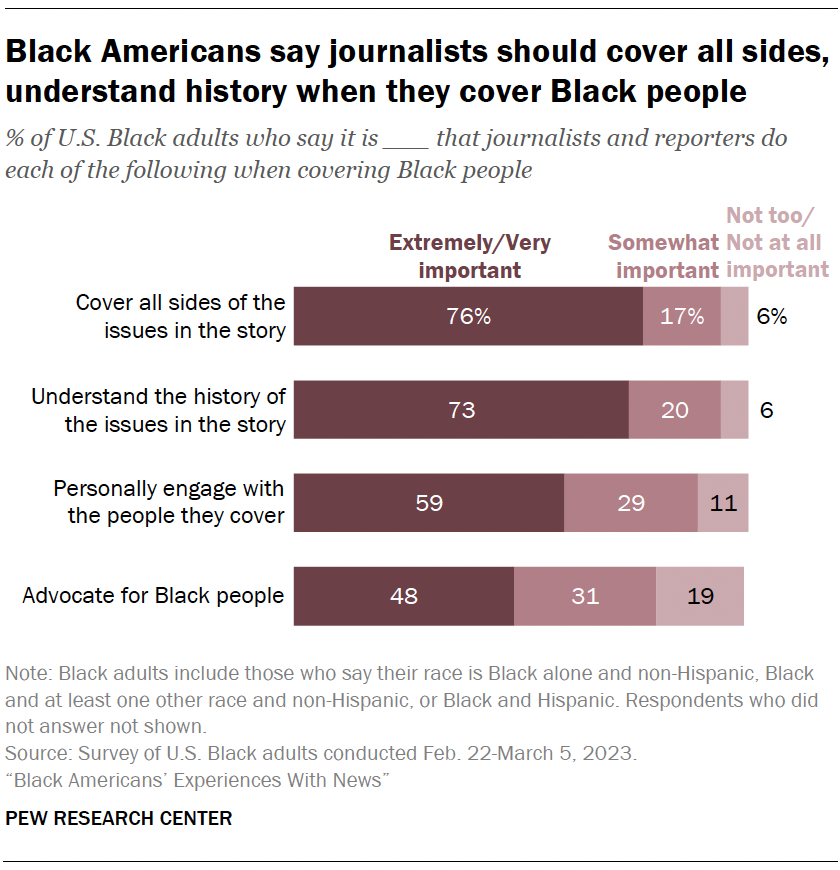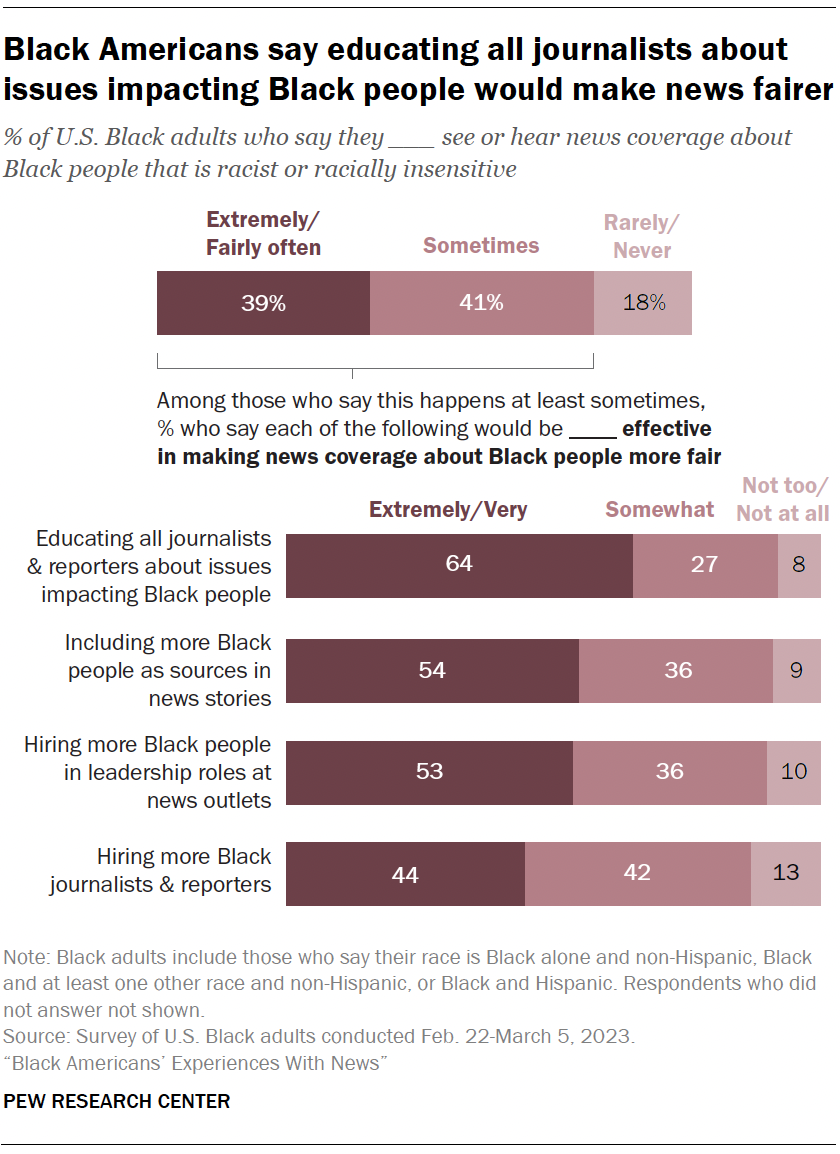While Black Americans express deep-seated concerns about how they are portrayed in the news, they see several ways in which that coverage could be improved.

About half or more of U.S. Black adults say covering all sides of an issue, understanding the history of the issues in the story, personally engaging with people they cover, and advocating for Black people are each extremely or very important for journalists to do when reporting on stories about Black people.
Two of these tasks stand out as particularly important in the eyes of Black Americans. About three-quarters (76%) say it is extremely or very important for journalists to cover all sides of the issues in a story when covering Black people, and a similar share (73%) say it is crucial for journalists to understand the history of the issues covered in the story.
Nearly six-in-ten Black Americans (59%) also say it is extremely or very important to personally engage with the people they cover, and about half (48%) say the same about advocating for Black people.
There are some differences within the Black population on these questions. Black adults with more formal education are more inclined than other Black adults to say it is crucial for journalists to do each of these things when covering Black people. And Black Democrats (including independents who lean toward the Democratic Party) are more likely than Black Republicans and Republican leaners to say three of the four are crucial. Members of the two political coalitions have similar views about the importance of covering all sides of issues.
Older Black Americans are more likely than younger Black adults to say it is extremely or very important for journalists to cover all sides of the issues in the story and understand the history of the issues in the story when covering Black people, but they are less inclined to say journalists should advocate for Black people. And while Black women and men largely see eye to eye about these tasks, women are somewhat more likely than men to think journalists should advocate for Black people (54% vs. 43%).
Quotes from focus groups on good journalism practices for covering Black Americans:
“You’re watching the news, anybody can tell you a story, but when you can see somebody that you’re relating to, then you know the story becomes more than a story. Especially when it comes to matters of civil rights, disabilities, stuff like that, it’s better when it comes from somebody who knows than somebody who’s just talking it because they don’t, because I can get that anywhere.” –Black woman, 23
“The reporters that I’ve followed and have grown to like have been people that have challenged on air something that’s not right, have been shown as allies especially in the last few years with everything going on and been outspoken when they are even interviewing someone, and they don’t agree with their narrative or what they’re saying.” –Black woman, 54
Key factors in making coverage fairer
Black Americans who said they at least sometimes come across news that is racially problematic about Black people – either because it is racist or racially insensitive (Read Chapter 1) – were asked how effective four potential solutions would be in making coverage fairer. These include educating all journalists about issues facing Black people, as well as three options that focused specifically on the role of Black people: including more Black people as sources in stories, hiring more Black journalists, and hiring more Black people in newsroom leadership roles.

Overall, many Black Americans say each of these steps would be helpful. Among those who say they at least sometimes come across news about Black people that is racially problematic, at least four-in-ten say each step would be extremely or very effective in making news coverage of Black people fairer, with more than eight-in-ten saying each would be at least somewhat effective.
But one solution rises to the top. Nearly two-thirds of respondents who at least sometimes report seeing racially problematic news (64%) think educating all journalists about issues impacting Black people would be extremely or very effective in making news coverage about Black people fairer.
Slightly more than half of Black Americans who at least sometimes see news about Black people that is racially problematic say including more Black people as sources in news stories and hiring more Black people in leadership roles at news outlets would result in fairer coverage (54% and 53%, respectively). And 44% say hiring more Black journalists at news outlets would also be highly effective.
While Black Democrats and Republicans express largely similar views when it comes to identifying problems with news coverage about Black people (read Chapter 1), there is less consensus about solutions. Among Black adults who say that they at least sometimes see news about Black people that is racially problematic, Democrats are more likely than Republicans to say each of the four steps mentioned in the survey would be effective in making coverage fairer. For example, 67% of Democrats say that educating all journalists about issues impacting Black people would be extremely or very effective, compared with 48% of Republicans.
More highly educated Black adults also are especially inclined to say each of the four steps would make coverage fairer.
Quotes from focus groups on the value of hiring more Black journalists:
“It matters to me too because it may be that Black journalist who challenged the colleagues, who challenged the radio stations to say why does the narrative have to be shaped this way?” –Black man, 61
“And I think it definitely does matter [that there are Black writers and columnists and so forth] and what matters equally usually is if a person is born and raised here because if they are then I think that they carry a certain level of cadence and delicacy than those who have moved here to report the news from someplace else.” –Black man, 29




